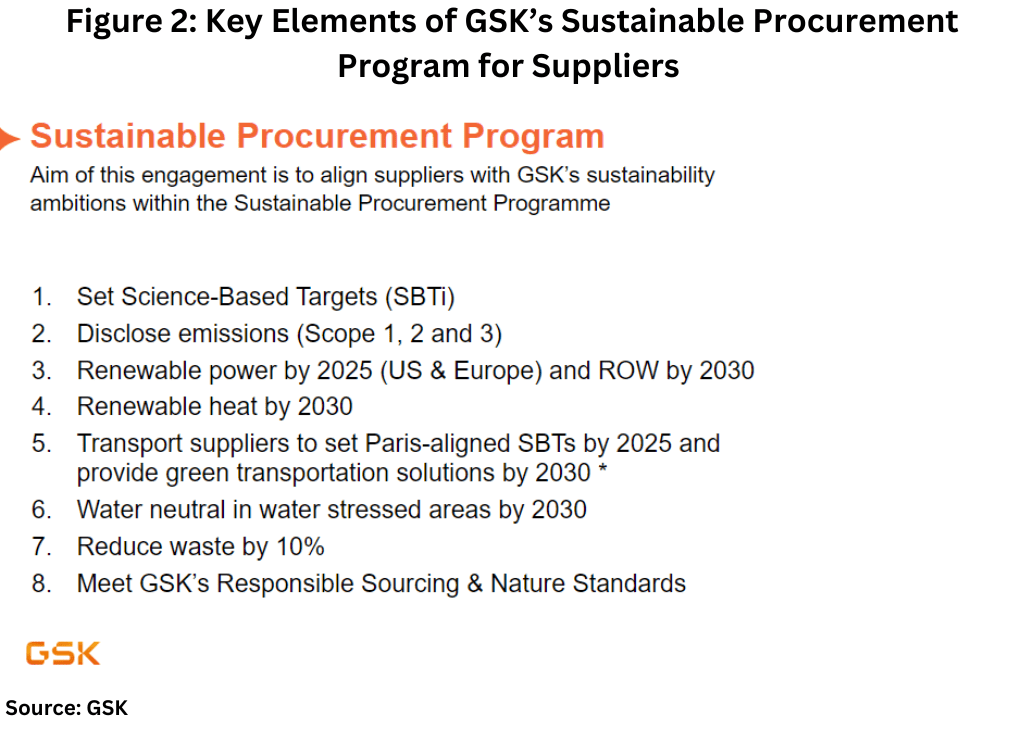Executive Insights: GSK’s Sustainable Procurement Program for Suppliers
Lisa Martin, Senior Vice President, Global Procurement, and Chief Procurement Officer, GSK, discusses the company’s Sustainable Procurement Program for Suppliers and how the company is working with suppliers to meet its sustainability targets.
Raising the bar in sustainability
Sustainability has always been important in the business activities of companies, but it has become more so with the setting of international climate goals as companies seek to contribute to meeting those global targets. In looking at the full value chain of a company, CDMOs/CMOs and other suppliers play an important role in a company realizing its sustainability targets, such as through reducing greenhouse gas emissions in manufacturing processes, adopting green production processes, and lowering waste.

Senior Vice President, Global Procurement,
and Chief Procurement Officer (CPO),
GSK
To gain a perspective on how environmental sustainability factors into supplier selection and evaluation, Lisa Martin, Senior Vice President, Global Procurement, and Chief Procurement Officer (CPO), GSK, provided a CPO view of sustainability and discussed key environmental sustainability targets of the company and how the company is working with suppliers to achieve those targets. She spoke at DCAT Week, the flagship event of the Drug, Chemical & Associated Technologies Association (DCAT), at the education program, “Industry Radar 2023: Raw Materials, Energy & Sustainability” held on March 21, 2023.
GSK and environmental sustainability
As a company, GSK has committed to a net-zero, nature-positive, healthier planet with ambitious goals set for 2030 and 2045. Figure 1 below highlights key targets set by the company (using 2020 levels as a baseline) for environmental sustainability.

Net-zero impact on climate. Reduction of greenhouse gas emissions is a key target for GSK. Within its operations, the company is seeking to achieve 100% use of renewable electricity by 2025. It is also seeking to achieve an 80% reduction in carbon emissions and investment in nature-based solutions for the remaining 20% of its footprint by 2030 and net-zero emissions across the company’s full value chain by 2045.
Net-positive impact on nature. GSK has also set goals in three main areas (water, materials & waste, and biodiversity) to achieve a net-positive impact on nature (see Figure 1 above). With regards to water, the company has set a goal to achieve good water stewardship at 100% of its sites by 2025 and to reduce overall water use in its operations by 20% by 2030. It has also set a target to be water-neutral in its own operations and at key suppliers in water-stressed regions by 2030. It has also set a zero-impact level (i,e., below the predicted no-effect level) for active pharmaceutical ingredients (APIs) for all its sites and at key suppliers by 2030 (see Figure 1 above).
In terms of materials and waste, the company has set targets of zero operational waste, including eliminating single-use plastics (where regulatory obligations allow and excluding plastics that are critical to product discovery and development and health & safety) by 2030. The company also has also set an environmental impact reduction of 25% for its products and packaging by 2030 and a goal of 10% waste reduction from its supply chain by 2030 (see Figure 1 above).
With regards to biodiversity, the company has set goals of positive impact on biodiversity at all GSK-owned sites by 2030. It also has set a goal to achieve 100% of agricultural-, forestry- and marine-derived materials sustainably sourced and deforestation-free by 2030 (see Figure 1 above).
External partnerships and collaboration with suppliers
GSK’s Martin explained that external partnerships as well as collaborative practices with its suppliers are important in the company’s strategy to meet its sustainability targets. These external partnerships include both cross-industry and pharma industry-specific initiatives. She highlighted several in which GSK is a part of: Energize, Manufacture 2030, and Activate.
Energize aims to accelerate renewable energy adoption to support climate action within the pharmaceutical value chain by enabling pharmaceutical suppliers to learn more about renewable energy adoption and contracting. The initiative gives suppliers, who may not otherwise have the internal resources or expertise available, the opportunity to participate in the market for power purchase agreements. The program helps pharmaceutical and healthcare suppliers to address their own operational Scope 2 greenhouse gas emissions (i.e., emissions associated with the purchase of electricity, steam, heat, or cooling) through green power procurement, which in turn will reduce participating companies’ Scope 3 emissions (i.e., value-chain emissions). The program was designed and is delivered by Schneider Electric. The pharmaceutical companies participating in the Energize promote the program collectively and individually invite their suppliers to participate.
The initiative includes 210 registered suppliers and sponsors. In addition to GSK, founding pharma companies part of Energize include AstraZeneca, Biogen, Johnson & Johnson, Merck & Co., Novartis, Novo Nordisk, Pfizer, Sanofi, and Takeda.
Martin underscored the importance of these partnerships. “To meet our ambitious environment commitments, we must partner across the supply chain,” said Martin in commenting on the program. “We joined forces with other pharma companies to help our suppliers increase their use of renewable energy and reduce their greenhouse gas emissions. A year on from its launch, Energize has its first two cohorts in the European Union and North America to progress with purchasing 2 terawatt-hour (TWh) of renewable electricity (the equivalent to 275,000 households), which includes a number of GSK suppliers.”
Energize is also partnering with the Pharmaceutical Supply Chain Initiative (PSCI), formed in 2006, as a company member-based organization focused on promoting responsible supply-chain practices, human rights, environmental sustainability, and responsible business. Earlier this year (2023), PSCI announced that Energize had become an official partner of PSCI.
GSK is also part of Manufacture 2030, which provides a software platform and support services to measure, manage, and reduce greenhouse gas emissions across global supply chains to corporations and their small and medium-sized suppliers. GSK is among the large corporations that are part of Manufacture 2030, which also includes the automakers Ford and Toyota and pharma companies Roche and Bayer.
“The platform and services allow suppliers to submit environmental data to GSK,” explained Martin. “Suppliers will also be able to access a wealth of best practice actions, expert advice, and enriching content, all aimed at helping them to reduce their carbon footprint while making their processes more resource- and cost-efficient for them.”
GSK is also part of a bio/pharma industry program, Activate, which was formed to accelerate decarbonization in active pharmaceutical ingredient (API) supply chains. The program was formed under the Manufacture 2030 initiative and includes six sponsors—GSK, Eli Lilly and Company, Johnson & Johnson, Pfizer, Merck & Co., and AstraZeneca. The program supports the decarbonization of API supply chains through the measurement, provision of practical tools, expert advice, and access to green financing. The program goes beyond data collection and was designed for sponsors to work closely with API suppliers to strengthen relationships, align with science-based decarbonization targets, drive more sustainable procurement, and identify opportunities for operational and resource efficiency.
Activate’s immediate focus will include onboarding API suppliers, capturing footprint data, establishing a reference point baseline, and tackling the most prominent areas of environmental impact. This will be funded by Activate through contributions from the founding member companies, which allow the first 200 API supplier sites that join to have their membership fees fully sponsored, according to information from the Activate program.
The second phase of Activate is intended to launch in the spring of 2024 and will see the Manufacturing 2023 initiative bring participants together to explore solutions to more complex challenges. These could include: support for building product carbon footprints at scale; deploying new tools and technologies collaboratively; and promoting access to green finance for decarbonization projects via independent financial partners.
Other external partnerships: tackling the data/reporting challenge
One of the challenges in environmental sustainability among companies overall is having common standards and reporting so that companies can evaluate their performance, both across other industries, and within their own industry, and between sponsor companies and their suppliers.
The Science Based Targets initiative (SBTi) is an organization focused on achieving common reporting/standards in environmental sustainability through the setting of science-based emissions reduction targets. In line with the Paris Agreement, an international treaty on climate policy, an overall goal of those international efforts is to cut greenhouse emissions globally by half before 2030 and to reach net-zero emissions by 2050. “Net-zero” emissions refer to a state in which the greenhouse gases going into the atmosphere are balanced by their removal out of the atmosphere. This goal takes collective action by governments and businesses, but a challenge for businesses is setting common standards for net-zero emission targets.
SBTi has set a net-zero standard to provide a framework for corporate net-zero target-setting in line with climate science. SBTi is a global collaboration between several organizations: the United Nations Global Compact, a United Nations pact among businesses worldwide to adopt sustainable and socially responsible policies and to report on their implementation; CDP, a non-profit organization that runs a global disclosure system for investors, companies, cities, states, and regions to manage their environmental impact; the World Resources Institute, a global research organization that works with governments, businesses, and civil society groups to address seven global challenges, including climate change; and the World Wide Fund for Nature, which is focused on environmental conservation.
GSK and its Sustainable Procurement Program for Suppliers
Aside from its participation in external partnerships in cross-industry and industry-specific initiatives, GSK also has its own program to work with its suppliers in reaching its sustainability targets, the Sustainable Procurement Program for Suppliers. Launched last September (September 2022), the program is designed to support the company’s suppliers toward having a net-zero impact on climate and a net-positive impact on nature in line with GSK’s environmental sustainability goals (net-zero Impact on climate, net-nature positive by 2030, see Figure 1 above).
Specific areas of action will include: disclosing emissions; setting carbon-reduction targets and delivery plans aligned to the 1.5 degree Celsius reduction in global warming through the Science Based Targets initiative; switching to renewable power and heat; achieving water neutrality in water-stressed areas; achieving 10% waste reduction; aligning to GSK’s responsible sourcing minimum standards; and transport suppliers providing green transport solutions. Supplier action will in turn help GSK achieve its environmental goals on climate and nature, as well as help both GSK and its suppliers create long-term value and build more business resilience. Figure 2 (below) outlines the specific targets of the program.

Martin explained that the key focus of the program is “to democratize sustainability by sharing standards, training, and learnings” and to take a collaborative approach with suppliers in meeting sustainability targets. She emphasized that data are a key component to pinpoint the root causes of sustainability needs in supply chains and that collaboration is key to accelerating the highest-impact solutions. In the initial phases of implementation of the company’s Sustainable Procurement for Suppliers, GSK brought together over 160 suppliers that are crucial to delivering the company’s sustainability goals to discuss how to work together toward these shared goals and understand the support that these suppliers will need to do so.







